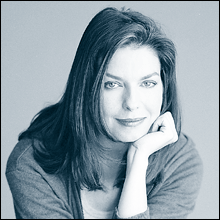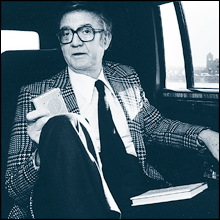![[Sidebar]](/standard/image/sidebar.gif)
![[Television]](/standard/image/headers/television_header.gif)
Chill out
Boston Public; Gideon's Crossing; Once and Again; Steve Allen
by Robert David Sullivan
The cast of 'Boston Public'
Now that the networks have begun getting rid of their weakest shows, it's time to declare this fall's TV line-up a failure. I should point out that I don't share the belief that television just gets worse every year; after all, that theory would lead to the conclusion that TV has taken 20 steps downward since The Dukes of Hazzard and The Love Boat were hits. Last year, there were plenty of new shows to get excited about, and a few of the best (including The West Wing) made it to a second season. But this season, my prime-time grazing feels closer to an actual job, and I'm starting to envy Paul Sorvino's character on That's Life: collecting tolls on the New Jersey Turnpike has got to be more fun, and carhorns are a lot less irritating than the pompous music of TV courtroom scenes.I pretty much agree with popular opinion this fall, and I'm thankful that the Nielsen families have spared me from having to watch Titans and The Street in order to keep up with the national zeitgeist. The underwhelming response to these mindless soap operas proves that if you openly advertise something as a guilty pleasure, it's never going to become one. Has any candy-bar manufacturer succeeded with the slogan "You're really going to wish you hadn't eaten this"?
But there are a few successes -- after all, people have to watch something before getting their news from The Daily Show. The favorite among my acquaintances who claim that they never watch television is NBC's romantic comedy Ed (Sundays at 8 p.m.), followed by Fox's high-school drama Boston Public (Mondays at 8 p.m.); both have been picked up for a full season. Boston Public is starting out like most shows created by David E. Kelley, grabbing audience attention with a truckload of plot lines on hot-button topics like racism, censorship, guns, drug testing, bullies, girls refusing to wear bras, and teenage sluts hitting on their teachers (those last two coming off as a middle-aged male screenwriter's fantasy). So much is going on here that the "previously on Boston Public" montage that opened the second episode made it seem as if the show had been on the air for five years.
Kelley makes all this easy to follow, if a bit difficult to believe. As on The West Wing, the characters are able to volley smart remarks during tense moments when most of us would be just trying to keep our knees from buckling. (Principal trying to dress down teacher: "Can I finish?" Teacher: "No, I'm saving you from completing a bad thought.") The huge cast is generally good, ranging from a measured Chi McBride as the principal to a chalkboard chewing Fyvush Finkel as a fossilized history teacher, but it's telling that the students on Boston Public are uniformly forgettable. Kelley characters seem to go into suspended animation after each perfect line of dialogue, and it takes an actor with great skill or a striking physique (think of Camryn Manheim or Calista Flockhart) to hold attention with his or her mouth closed. Boston Public can certainly chug along on hot-button issues for a year or two, but if the actors don't get a chance to relax and put their own stamp on the characters, this show is going to end up as stiff as The Practice, where Dylan McDermott has turned into the most humorless and unlikable lead character since Jack Webb in Dragnet.
In addition to Ed and Boston Public, I'm also keeping tabs on Gideon's Crossing, the ABC medical drama that, no surprise, is getting creamed by Law & Order. One reason is that I'd watch Andre Braugher, the show's star, reading scripts from Gilligan's Island. Hell, he'd even make Abbott and Costello's "Who's on First?" routine sound as if it were about something. Another reason is that the show's producers and writers, many of whom worked with Braugher on Homicide: Life on the Street, seem to go out of their way to aim over the heads of the audience. This is especially true whenever there's a reference to Boston, where the show is set. Why have a character say "subway pass," which anybody in America could understand, when you can have him say, "You stole my T pass," which may be more authentic but means nothing west of Worcester? Or why not throw in a "Phoenix" reference without making it clear that you're talking about this fine weekly publication and not the city in Arizona?
I can understand why the intelligent but overly intense Gideon isn't exactly catching fire. It must have been depressing for Braugher and company to do Homicide all those years, and the medical profession must have seemed like a good source for more uplifting stories. The trouble is, it's interesting when police detectives talk about all the possible reasons for one person to kill another, but even the most articulate doctor quickly runs out of material when speculating on why someone gets cancer. Now if Gideon were produced by Pat Robertson, and based on the notion that a disease is God's punishment for a sinful past, then we'd have a real corker of a mystery series.
As for sit-coms, the only remotely interesting entry has been CBS's Bette, which has been getting good ratings despite a consensus that the show's writers haven't yet figured out what to do with Bette Midler's larger-than-life personality. My theory is that there's always room for one hit sit-com with an overacting star trying to overcome stale material: after Fran Drescher in The Nanny, we got John Lithgow in 3rd Rock from the Sun, and now it's Midler's turn.
AFTER WATCHING so many so-so new series, I'd have to say the most exciting moment on TV so far this season has been a dispute over the rules of Monopoly on the ABC drama Once and Again. Grace (Julia Whelan), a hypersensitive high-school student, had just landed on a property with a hotel owned by younger sister Zoe (Meredith Deane). But Zoe was distracted over counting her money, and Grace got the third player -- Jessie (Evan Rachel Wood), whose dad is going out with Grace and Zoe's mom, and who has been desperately trying to get along with both potential stepsisters -- to roll the dice before Zoe noticed what was going on. When Zoe demanded payment, Grace said that she'd missed her chance. (Like all teenagers, Grace has a lawyer's grasp of technicalities and loopholes.) Zoe screamed, Mom A and Dad B ran into the room, and everyone tried to get a straight story out of Jessie, who just sat there, obviously thinking, "I might have to live with these people?"
As Emmy bait, the scene was hardly in a league with a closing argument on The Practice -- which may have been why I paid attention instead of flipping through magazines. In fact, I didn't finish that Kim Cattrall interview in New York magazine until Law & Order the next night, when new cast member Dianne Wiest, playing a humorless district attorney as if trying to atone for the endearing characters she's portrayed in Woody Allen movies, gave a speech about how not all HMO executives are as evil as the one Sam Waterston was prosecuting in that episode. (The speech presumably met the approval of NBC's legal department.) The Law & Order episode began with the discovery of a dead woman on a subway bench, but she was just another corpse to me, and just another cue for yukmaster Jerry Orbach's "I got a million of them" routine (something about "taking the express" as a euphemism for being clobbered with a hunk of cement). Cheating at a game of Monopoly, on the other hand, is an issue of great significance to anyone who has ever played a board game with siblings.
Sela Ward in 'Once and Again'
Once and Again is one of those shows that's a lot better than I can possibly make it sound. It also has a lot more resonance after you've seen a few episodes and figured out how all the characters are connected, which explains why it's never become a big hit. (That's the danger of trying to do a romantic series with more depth than Mad About You.) You might say that the situations on Once and Again aren't terribly dramatic. At least, they're not dramatic enough to warrant the swelling violins that you can hear every night at 10:49 p.m. on one network or another as some guest star confesses to molesting, shooting, or cheating on a daughter, best friend, or spouse. Near the end of last week's show, I realized that the previous episode's Monopoly scene had been a foreshadowing of the sibling rivalry between grown-ups Lily (Sela Ward, who's beginning to recall Mary Tyler Moore in her comic timing) and Judy (Marin Hinkle). I was happy to figure that out without the benefit of close-ups or musical cues, and even happier when I saw that I still had an untouched crossword puzzle in reserve for The Fugitive.
Steve Allen
And if I seem especially tough on courtroom dramas this week, it may be because I watched a preview of Real Justice, a compelling two-part documentary airing on PBS's Frontline (November 14 and 21 at 10 p.m.). The cinéma-vérité program, with minimal narration and music, follows several cases in Boston's criminal courts ranging from drug dealing to murder. Real Justice is mandatory viewing for anyone who wants to see an authentic version of The Practice -- Boston accents and all.NOTHING DAMAGES the reputation of a cutting-edge artist like old age. Steve Allen, who died last week at 78, was once known as the creator of The Tonight Show and as a pioneer in TV guerrilla comedy -- at the top of a family tree that includes not only Johnny Carson and David Letterman and Jay Leno but also Tom Green and Jackass's Johnny Knoxville. More recently, he became known as the national scold who condemned radio shock jock Howard Stern and took out newspaper ads warning of "the tragic consequences of TV filth, sex, and violence." That may seem incongruous when you recall that Allen was a champion of "sick comic" Lenny Bruce in the late '50s. But Bruce, who died of a drug overdose in 1966, would be 74 today, and I can easily imagine him criticizing today's TV comics for performing bowdlerized versions of his own act -- purged not of dirty words but of political content. As for Allen, he never used raw language, preferring to get laughs through silly wordplay, bizarre physical stunts (jumping into a vat of Jell-O, for example), and the gentle teasing of anybody who happened to wander into camera range when he took his shows out on the street. One constant throughout his many shows was his infectious laugh, and I like to think that what offended Allen the most about Stern and company is that they just don't seem to be having as much fun as he did.
Copyright © 2000 The Phoenix Media/Communications Group. All rights reserved.


